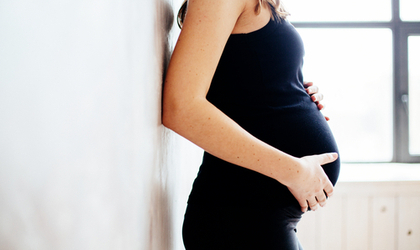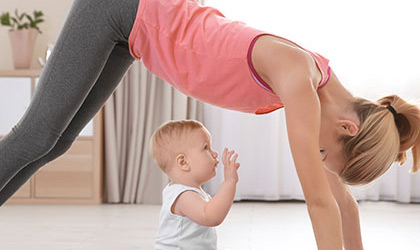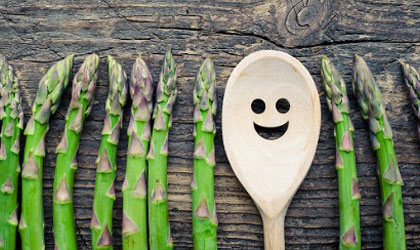
In the UK, veganism is on an unstoppable rise. Many factors drive its popularity, including concern for animal welfare and climate change. People are also turning to veganism in pursuit of health – and no wonder: a whole-food, plant-based lifestyle is increasingly associated with improved mood, cardiovascular function, and longevity (1).
Some worry a plant-based diet may leave women more prone to nutritional deficiencies. However, with careful planning, a vegan pregnancy should be completely safe. Just be sure to watch your intake of the following nutrients. And always keep your GP and midwife in the loop.
Iron
During pregnancy, your iron requirements double, jumping to 27mg daily. Iron produces haemoglobin, which supports the transportation of oxygen around your body to tissues, cells, and, most importantly, your baby (2). Low levels can make you feel fatigued, light-headed, and dizzy, which can aggravate the usual pregnancy symptoms.
The most bioavailable (readily absorbed) sources of iron are typically animal-derived products, such as meat, fish, and dairy, which are off the menu for vegans. Nevertheless, you can also find iron in plant-based foods like dark green vegetables, dried fruit, pulses, seeds, and dark chocolate.
Combining iron with a serving of vitamin C – naturally present in lemon, cabbage, broccoli, spinach, and tomatoes – can further support absorption.
Vitamin B12
Like iron, vitamin B12 is critical during pregnancy. Vitamin B12 plays a vital role in the DNA-making process, as well as nerve and blood health (3). Without enough in pregnancy, it can lead to neural tube defects, pre-eclampsia, low birth weight, and even miscarriage (4).
Although you can find a small amount of vitamin B12 in yeast extract (Marmite), fortified breakfast cereals, and fortified unsweetened soya drinks, the best sources are animal foods like red meat, poultry, liver, fish, shellfish, eggs, and dairy products, which can be challenging for vegans.
Taking a supplement – or comprehensive B vitamin complex with relevant levels of vitamin B12 – will ensure you and your baby get enough during pregnancy on a vegan diet.
Calcium
Calcium is a building block for healthy teeth, bones, muscles, heart, and nerves in pregnancy (5). By the time you reach your third trimester, your calcium demands increase as your baby’s skeleton begins to develop. If your baby doesn’t get what they need, they’ll leach it from your bones, leaving you more vulnerable to osteoporosis (brittle bones), so ensuring a plentiful intake is essential.
Studies suggest an adequate calcium intake may also reduce a mother’s risk of pregnancy complications, such as pre-eclampsia and hypertension (6).
Though dairy products are some of the best sources of calcium, you can also find it in plant foods, including dark leafy green veggies, brown bread, dried figs, beans, sesame seeds, tahini, calcium-set tofu, and fortified, unsweetened oat, rice, and soya milk.
Still, to ensure a reliable intake of calcium during pregnancy, you may wish to take a supplement to cover any nutritional shortfalls.
Vitamin D
Vitamin D3 is another important nutrient during pregnancy. Together with calcium, it supports the growth of your baby’s teeth and bones (7). Research suggests low levels of vitamin D3 may lead to poor birth outcomes, including low birth weight and pre-eclampsia, as well as pregnancy complications like gestational diabetes (8).
The best way to synthesise vitamin D3 is from direct sunlight. You need around 15 minutes of sun exposure every day. During the summer months, this is easy. But getting enough is harder between October and March.
You can also meet your recommended daily allowance through food, although the most abundant sources derive from animals like oily fish, meat, and eggs. Some plant foods contain vitamin D3 – mushrooms and fortified tofu, soya milk, and cereals – but it won’t be enough to meet your daily intake alone.
So, if you’re vegan, we suggest taking a plant-based vitamin D3 supplement that provides 10µg, in line with the NHS advice for pregnant women (9).
Omega 3
During pregnancy, your body needs a steady supply of omega-3s to support your baby’s health. The essential fatty acid, docosahexaenoic acid (DHA), is especially important. This omega-3 is involved in the visual and cognitive development of a growing foetus (10). Low maternal DHA has also been linked to an increased risk of mood disorders in new mums (11).
Omega-3 fatty acids are typically found in high concentrations in oily fish, which can be challenging for those on plant-based diets. However, you can find alpha-linolenic acid (ALA) – an essential fatty acid converted into DHA in small amounts in the body – in plant foods like chia seeds, hemp seeds, flaxseeds, and walnuts.
Microalgae is also an excellent vegan source of DHA. You can take it as a supplement throughout pregnancy to support your intake.
Iodine
An essential trace mineral, iodine is vital for pregnancy. Iodine supports the production of maternal and foetal thyroid hormones, which help the development of a baby’s brain and nervous system (12).
The best sources of iodine are dairy, eggs, and milk, so those on plant-based diets usually struggle. Seaweed is a great option for vegans, but it can deliver an overabundance of iodine, which can be dangerous in pregnancy.
With this in mind, we recommend taking an iodine supplement to as an insurance policy to protect you and your baby during pregnancy.
Consider a multivitamin
There’s a lot to think about during pregnancy. If you want to make life easier for yourself, you may wish to take a high-strength, comprehensive multivitamin. It’s a simple and convenient way to ensure a plentiful supply of the most important pregnancy nutrients – vitamin D3, iodine, iron, choline, and calcium – to support your health and the development of your baby on a vegan diet.
Find out more
If you found this article on veganism in pregnancy useful, you can find similar guidance on our health blog. Alternatively, please get in touch with our team of expert Nutrition Advisors, who are on hand to provide free, confidential advice
References:
-
Clem J, Barthel B, A Look at Plant-Based Diets. Mo Med. 2021;118(3):233-238. PMID: 34149083.
-
Nutrition During Pregnancy. [online] Available at: https://www.acog.org/womens-health/faqs/nutrition-during-pregnancy
-
Allen LH, Vitamin B-12. Adv Nutr. 2012;3(1):54-5.
-
NHS Choices, Complications - Vitamin B12 or folate deficiency anaemia. [online] NHS. Available at: https://www.nhs.uk/conditions/vitamin-b12-or-folate-deficiency-anaemia/complications/
-
Harvard School of Public Health, Calcium. [online] The Nutrition Source. Available at: https://www.hsph.harvard.edu/nutritionsource/calcium/
-
Woo Kinshella M, Sarr C, Sandhu A, Bone JN, Vidler M, Moore SE, Elango R, Cormick G, Belizan JM, Hofmeyr GJ, Magee LA, von Dadelszen P, Calcium for pre?eclampsia prevention: A systematic review and network meta?analysis to guide personalised antenatal care. BJOG: An International Journal of Obstetrics & Gynaecology. 2022;129(11):1833–1843.
-
NHS inform, Vitamins and minerals in pregnancy. [online] NHS inform. Available at: https://www.nhsinform.scot/ready-steady-baby/pregnancy/looking-after-yourself-and-your-baby/vitamins-and-minerals-in-pregnancy/
-
Wagner CL, Taylor SN, Johnson DD, Hollis BW, The role of vitamin D in pregnancy and lactation: emerging concepts. Womens Health (Lond). 2012 May;8(3):323-40.
Yue CY, Ying CM, Sufficience serum vitamin D before 20 weeks of pregnancy reduces the risk of gestational diabetes mellitus. Nutr Metab (Lond). 2020;17:89. -
NHS, Vitamins, minerals and supplements in pregnancy. [online] nhs.uk. Available at: https://www.nhs.uk/pregnancy/keeping-well/vitamins-supplements-and-nutrition/
-
Basak S, Mallick R, Duttaroy AK, Maternal Docosahexaenoic Acid Status during Pregnancy and Its Impact on Infant Neurodevelopment. Nutrients. 2005;(12):3615.
-
Hibbeln JR, Seafood consumption, the DHA content of mothers’ milk and prevalence rates of postpartum depression: a cross-national, ecological analysis. Journal of Affective Disorders. 2002;69(1-3):15–29.
-
De-Regil LM, Harding KB, Peña-Rosas JP, Webster AC, Iodine supplementation for women during the preconception, pregnancy and postpartum period. Protocol. Cochrane Database of Systematic Reviews. 2015. Issue 6. Art. No.: CD011761.
You Might Also Like

Keri
Keri Filtness has worked in the Nutrition Industry for 19 years. She is regularly called upon for her professional comments on health and nutrition related news. Her opinions have been featured by BBC3, Prima, Vitality, The Mirror, Woman’s Own and Cycling Weekly, amongst others. She has also worked one to one with journalists, analysing their diets and health concerns and recommending changes and additions, where appropriate.
View More






